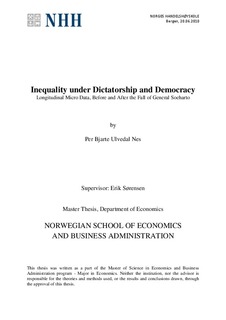| dc.contributor.author | Nes, Per Bjarte Ulvedal | |
| dc.date.accessioned | 2010-08-13T06:46:48Z | |
| dc.date.available | 2010-08-13T06:46:48Z | |
| dc.date.issued | 2010 | |
| dc.identifier.uri | http://hdl.handle.net/11250/168549 | |
| dc.description.abstract | Economic growth justified the autocratic New Order government of
general Soeharto to the Indonesian public. The Asian financial crisis
stalled growth and ended the New Order administration in 1998, then
electoral democracy was instituted. This initiated a mass of policy
changes, importantly including a large decentralization of fiscal and
legislative power. This study explores the development of economic
inequality in the tumultuous periods before and after the fall of Soeharto.
The results show a decrease in inequality and converging provinces pre-
crisis and for the whole period. However, in the post-crisis democratic
period, income inequality increased, as did inequality between provinces. | en |
| dc.language.iso | eng | en |
| dc.title | Inequality under dictatorship and democracy : longitudinal micro data, before and after the fall of general Soeharto | en |
| dc.type | Master thesis | en |
| dc.subject.nsi | VDP::Samfunnsvitenskap: 200::Statsvitenskap og organisasjonsteori: 240 | en |
| dc.subject.nsi | VDP::Samfunnsvitenskap: 200::Økonomi: 210::Samfunnsøkonomi: 212 | en |
